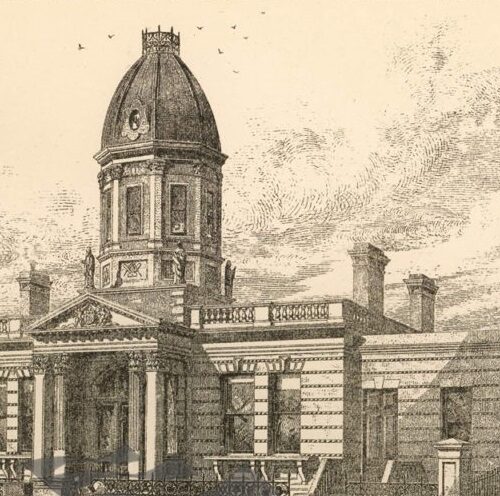

Without denying or affirming a life after death, or reality beyond experience… we can (without injury to our moral life) make our moral ideas independent of these beliefs.
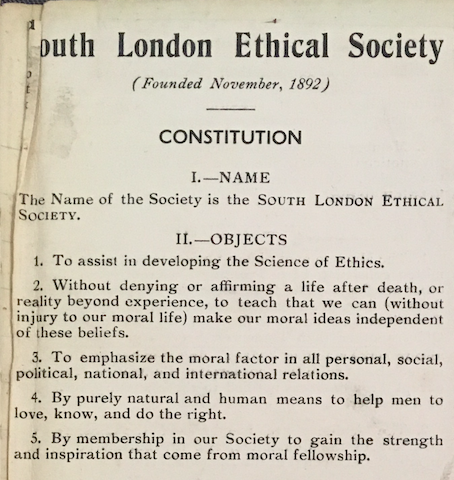
The South London Ethical Society began with a meeting at Chepstow Hall, Peckham on 27 November 1892, and a lecture by Stanton Coit – the Society’s President – entitled ‘Am I My Brother’s Keeper?’ Its object was almost identical to that of the already extant West and East London Ethical Societies: ‘the development of good character and the promotion of right conduct on a purely human basis’. The South London Ethical Society offered lectures and discussions on ethical subjects, as well as a Sunday School (opened in 1893).
In 1894, the Society moved to the Surrey Masonic Hall, Camberwell, and its membership and income grew steadily over the following years. Its annual report for 1896/7 boasted lecture attendances of between two and three hundred people. In addition, the Society developed Junior and Adult Reading Circles, a Ramblers’ Club, and Discussion Meetings, ‘which stood for freedom of thought’. They also operated a ‘Visiting Committee’, ‘moved by the… desire to bring home the sense of fellowship to sick and sorrowing members.’
The South London Ethical Society’s Secretary from its outset was Florence Aspasia Law, the daughter of famed freethought lecturer Harriet Law. In a sketch of the Society written for The Ethical World in 1898, Law described ‘democratic sociability’ as ‘the leading feature of the South London Ethical Society’. Its membership stood at 180, ‘none of whom are rich, and many poor,’ but busy with lectures, discussions, reading groups, social meetings, and monthly rambles. Democracy and sociability were prized:
The most hopeful sign in the Society is that its work is shared among many members. A society should be a living organism, and not a mechanical mixture of heterogeneous atoms.
Florence A. Law, Secretary
In an address delivered in October 1908, Harry Snell invited:
all those present who had not already done so to become members of a society which knows no creed beyond the simple one of helping men, by purely natural and human means to love, know, and do the right, and which seeks to put this simple creed into practice by meeting as a fellowship, and making itself known to all sympathisers with such a work.
The Society maintained a strong membership base throughout the early years of the twentieth century, including through the First World War. In 1919, its meeting place moved to Oliver Goldsmith School, Peckham Road. During this time, as historian of the Ethical movement I.D. MacKillop described in The British Ethical Societies:
[South London Ethical Society] owed much of its appeal to the personality of the socialist secretary, Nellie Slous Freeman, a gentle school teacher from a free-thinking family.
Regular lecturers included Stanton Coit, Washington Sullivan, Joseph McCabe, Harry Snell, William Sanders, F. J. Gould, and J. M. Robertson. Lectures were also given by Emilie Holyoake, Zona Vallance, Florence Routledge, Ruth Homan, May Seaton-Tiedeman, James Ramsay MacDonald, and Bertrand Russell. The subjects of these lectures give a clear sense of their chief interests and concerns: scientific grounds for thought and belief; doing good in the world; refutation of ideas of immortality; concern with social problems and reform; literature and art; and community.
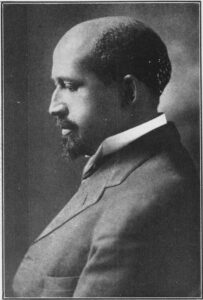
If living does not give value, wisdom and meaning to life, then there is no sense in living at all. […]
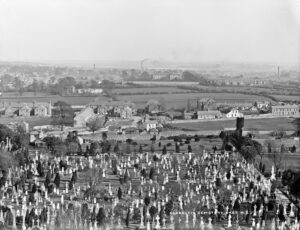
Glasnevin Cemetery is a nondenominational cemetery in Ireland, first opened in 1832. The brainchild of Catholic rights leader Daniel O’Connell, […]
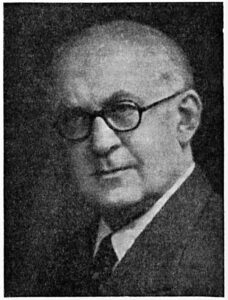
The educative work and the profound enlightenment resulting from the publication of the cheap RPA reprints and the Thinker’s Library […]
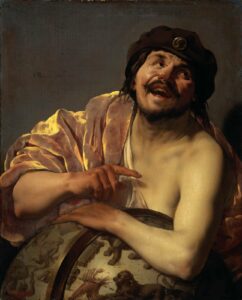
Everywhere man blames nature and fate yet his fate is mostly but the echo of his character and passion, his […]